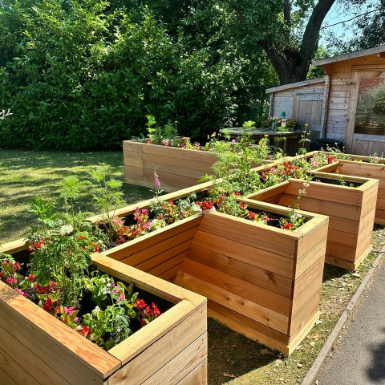
How Gardening Can Support Mental Health and Wellbeing
Connecting with nature through gardening is a great way of supporting good mental health. For many, entering the world of plants and the seasonal cycles of nature can be an emotional, comforting, and healing experience—creating a sanctuary where mental resilience grows alongside the greenery.
Research shows that gardening nurtures mental health, and personal connection with green spaces matters. Therapeutic horticulture can become a cornerstone of mental wellness at any stage of life. Whether you’re a family member encouraging a loved one to try gardening or someone starting your own journey, here are some practical ideas for how you can embrace the healing power of nature, forming a strong mental health foundation.
Cognitive Benefits of Creating Your Personal Green Sanctuary
A well-tended garden transforms any outdoor area into a peaceful retreat—a personal sanctuary where stress melts away. Therapeutic gardening programmes often encourage participants to bring familiar tools, favourite plants, or sentimental ornaments, helping create a space rich with personal meaning. These treasured elements nurture feelings of growth, progress, and renewal, reinforcing the link between caring for a garden and caring for one’s mental health.
The gardening mental health benefits are well researched. For people managing anxiety or depression, even small gardening tasks—such as caring for potted plants or maintaining an herb garden—provide gentle physical activity and a calming focus. These activities promote relaxation and help increase positive emotions, easing feelings of overwhelm. A thoughtfully arranged garden provides a strong connection to the natural world’s healing power, helping reduce stress and foster calmness in everyday life.
The Importance of Connecting with Nature for Mental and Physical Health
Spending time in natural environments is deeply therapeutic. Observing the changing seasons, watching wildlife, and engaging with plants help maintain emotional connections beyond ourselves—rooting us in the broader world. Nature connectedness has consistently been linked to improved moods, stress reduction, and higher life satisfaction.
Gardening also supports identity and memory. Growing flowers that remind you of loved ones or cultural heritage vegetables can strengthen bonds to cherished memories and personal history. Maintaining perennial plants or creating beautiful floral arrangements helps nurture a sense of accomplishment and belonging. This connection to nature reminds us of our own potential—to heal, grow, and create beauty. The garden becomes more than just a physical space; it becomes a living reflection of personal wellness and identity.
Therapeutic Horticulture: Hands-On Healing With Plants and Soil
The physical interaction with soil, plants, and gardening tools itself offers grounding and therapeutic effects. Many gardeners report that the textures of earth, leaves, and equipment are comforting, helping them feel restored during challenging times. Gardening activities can improve cognitive functions such as attention and memory, alongside offering emotional and psychological benefits. Planting, weeding, watering, and harvesting promote a purposeful connection to the environment. Allowing people to personalise their garden according to interests ensures that time spent gardening feels inviting and rewarding. This tailored approach not only boosts self-esteem but also contributes significantly to overall health and mental wellbeing by inspiring a sense of achievement.
Mindful Gardening for Health Benefits
How you approach gardening influences your mental state profoundly. Gentle, meditative tasks like pruning or watering plants encourage mindfulness—a calming focus on the present moment. Practices such as therapeutic horticulture and green exercise (physical activity in natural settings) are proven to aid stress reduction and promote mental clarity. Observing seasonal growth and wildlife behaviour supports positive mental patterns and a feeling of connection. For those with fond memories of nature, cultivating plants that attract birds or butterflies can rekindle joyful associations and ease transitions from stressful environments. Creating a garden that supports quiet reflection alongside active gardening provides a balanced, peaceful space for mental restoration.
Gardening as a Catalyst for Social Connection and Community
Social interaction is essential for mental wellness, and gardens naturally foster togetherness. Designing outdoor spaces with comfortable seating and areas for group gardening encourages family, friends, and neighbours to connect and support one another. Community gardening projects in residential care homes offer inclusive opportunities for shared experiences, reducing social isolation and building networks of care. Sharing home-grown produce at meals or participating in garden-based social activities strengthens bonds and creates a warm, therapeutic atmosphere. Therapeutic and social horticulture projects play a vital role in mental and physical health care, providing structured ways for people to engage, recover, and thrive together.
Harnessing the Power of Natural Scents and Sounds
The scents and sounds found in gardens profoundly influence mood and wellbeing. Fragrant herbs like lavender, the earthy smell of rain-soaked soil, and blooming flowers evoke calmness and familiarity. These sensory experiences contribute to positive effects such as mental relaxation and emotional balance. Natural sounds—from birdsong and buzzing bees to rustling leaves and water features—create soothing soundscapes that lower stress and enhance peace. Indoor plants can also bring these calming effects inside. Recognising these benefits, many mental health professionals advocate integrating natural elements into therapy and daily routines to complement clinical care.
Balancing Activity and Rest for Sustainable Benefits
While active gardening is beneficial, balancing it with periods of rest and quiet observation is equally important, especially for older adults or those with health and mental health challenges. Gardens should be accessible, manageable, and adaptable to different energy levels. Carers can collaborate with individuals and families to tailor gardening activities—ensuring they remain enjoyable and pressure-free. Creating spaces that offer both active engagement and peaceful solitude supports ongoing wellbeing and makes gardening a sustainable part of lifestyle and therapy.
Embracing a Garden-Centred Lifestyle for Holistic Health
A nurturing garden nurtures the gardener. Scientific research, including meta-analyses, confirms gardening’s positive impacts: elevated mood, reduced stress, enhanced wellbeing, and even physical health benefits like lower blood pressure and reduced cardiovascular risk. Garden-based activities complement clinical mental health care by offering restorative, accessible, and meaningful ways to support recovery and life satisfaction. From window boxes to community gardens and private green spaces, access to gardening fosters inclusivity and promotes population-wide health benefits.
Environmental psychology and public health guidance emphasise how cultivating green infrastructure, addressing climate change, and engaging with nature contribute to comprehensive mental wellness strategies. Even spending as little as 30 minutes in natural blue or green spaces can significantly boost wellbeing, demonstrating the wide-reaching effects gardening and nature have on individual and community health.
Embracing Nature at Manor House Care Home
Gardening is a unique intersection of physical activity, mindfulness, social connection, and therapeutic engagement. Creating and caring for a garden cultivates calm, nurtures mental resilience, and fosters deep connections—to oneself, others, and the natural world.
Whether you’re seeking personal solace in a home garden or supporting a loved one through therapeutic horticulture, gardening offers a pathway to renewed mental health and vibrant wellbeing. By embracing nature’s rhythms and putting down roots in green spaces, it’s possible to transform mental health challenges into opportunities for growth, healing, and joy. If you'd like to find out how we incorporate nature and outdoor spaces into our activities programme please get in touch, we'd love to invite you to vist our home and see our garden for yourself.
